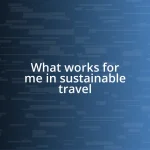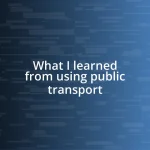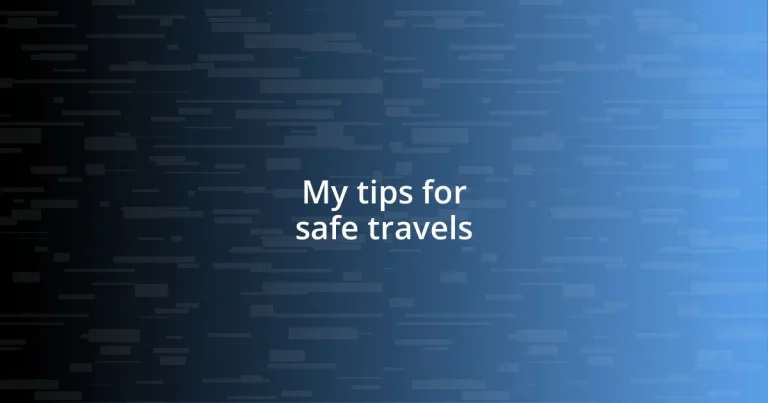Key takeaways:
- Thoroughly research your destination’s safety, local customs, and emergency contacts to avoid unexpected issues.
- Ensure you have adequate travel insurance, understand coverage details, and keep policy information accessible.
- Be prepared for emergencies by packing essential items, maintaining an emergency plan, and sharing your itinerary with someone trustworthy.
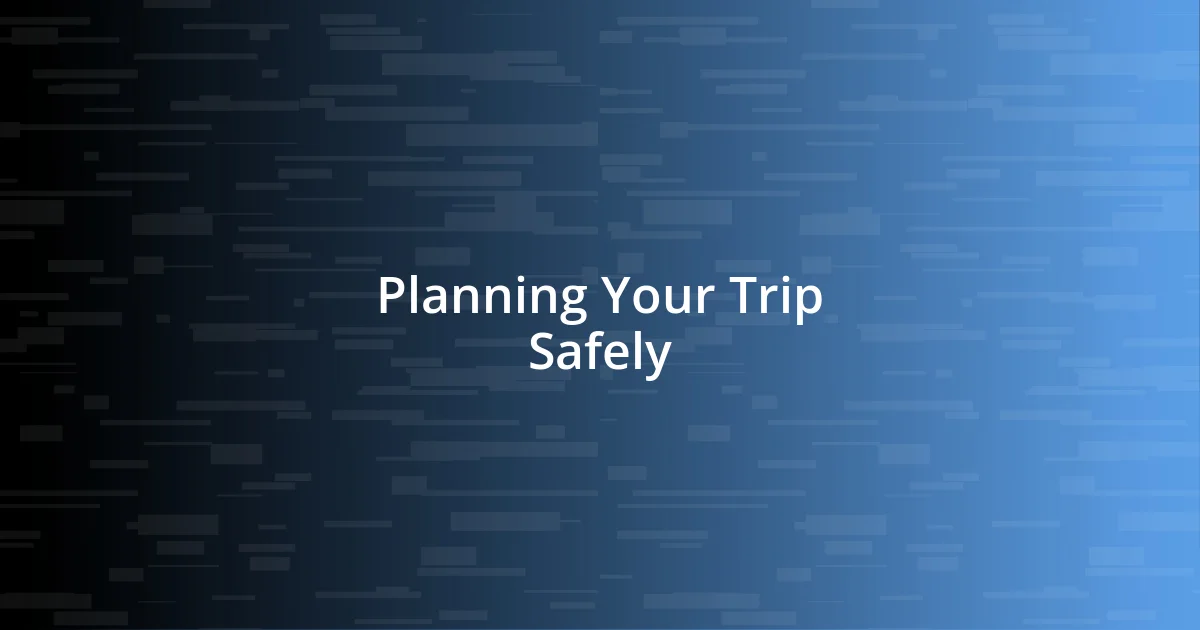
Planning Your Trip Safely
When planning your trip, I find it essential to research your destination thoroughly. I remember feeling a wave of relief when I discovered that the public transportation system in a city I was visiting was safe and reliable. That’s when I realized how important it is to know local customs and regulations to avoid any unexpected surprises; have you ever felt unprepared in a new place?
One thing I always do is create a detailed itinerary, including important addresses and emergency contacts. I learned the hard way that having a written backup can save you from a lot of stress. Once, while traveling abroad, my phone died, and I was lost and panicked. That experience taught me to prepare for the unexpected.
It’s also wise to share your travel plans with a trusted friend or family member. I can’t stress enough how comforting it is to know someone has your back while you’re away. If something goes awry, it’s invaluable to have someone who knows your whereabouts, don’t you think? Being mindful about these details can transform your adventure into a safe and enjoyable experience.
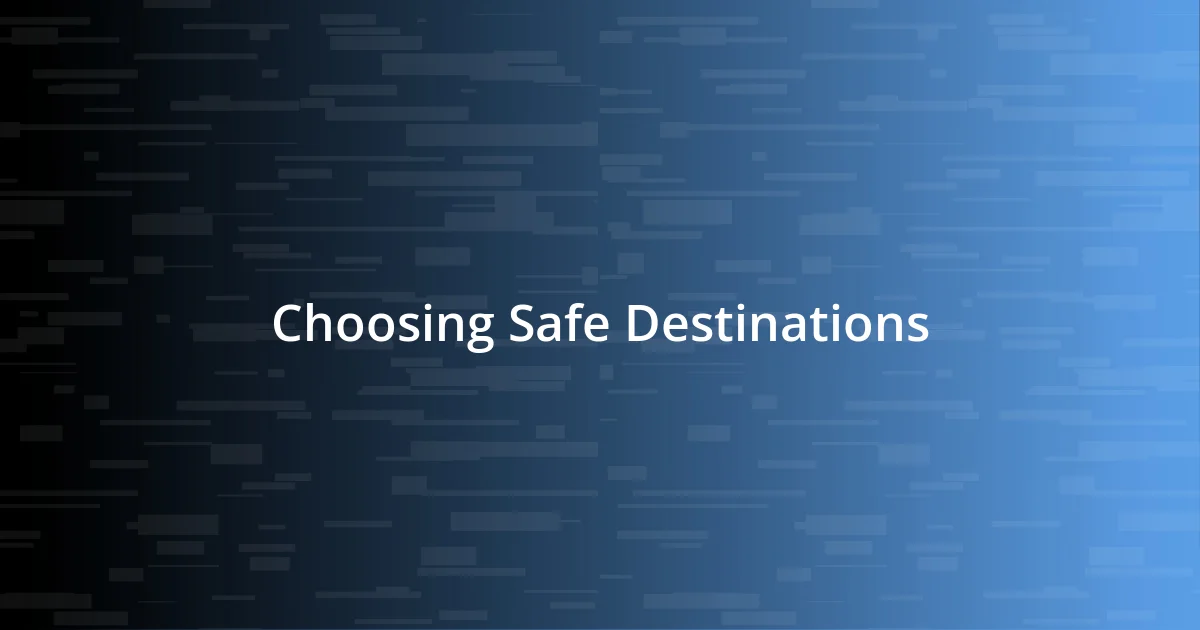
Choosing Safe Destinations
Choosing a safe destination is critical for a stress-free trip. I recall a time when I opted for a lesser-known town, intrigued by its charm, only to later discover it had a high crime rate. That moment reinforced my belief that checking recent safety reports or travel advisories can significantly impact my overall experience. It’s a reminder that safety should never take a backseat to curiosity.
When considering a destination, here are a few practical tips I find helpful:
– Research Crime Rates: Look up statistics or travel advisories on local crime.
– Read Recent Reviews: Experience from fellow travelers can provide insight into current conditions.
– Evaluate Health Risks: Check for any travel warnings about disease outbreaks.
– Understand Local Laws: Familiarize yourself with rules and customs to avoid trouble.
– Consider Political Stability: Gauge the nation’s current political climate and recent events.
These steps may seem basic, but each one has enhanced my peace of mind while exploring new places. Taking safety seriously allows you to immerse yourself in the adventure without worry.
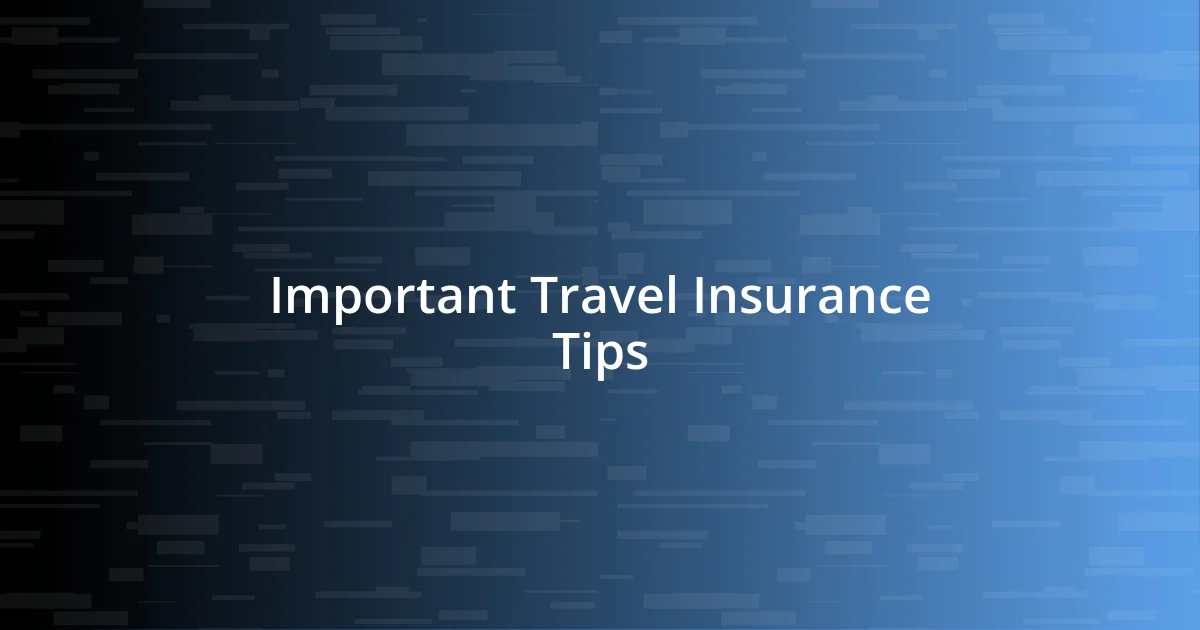
Important Travel Insurance Tips
One of the most crucial aspects of traveling is securing the right travel insurance. I’ve learned from experience that not all policies are created equal. On a trip to Europe, I had to file a claim due to a last-minute flight cancellation. It was then I discovered the importance of reading the fine print. Some policies cover cancellations for specific reasons, while others may leave you hanging. Make sure you understand what you’re covered for before setting off on your journey.
Another key tip is to evaluate coverage limits, especially for medical emergencies. During my hiking trip in South America, I witnessed an unfortunate accident involving another traveler who didn’t have adequate medical coverage. This underscored my belief that buying sufficient coverage is paramount—for instance, consider how much a helicopter rescue could cost. It’s better to be safe than sorry, and knowing you’re covered can alleviate a lot of stress, right?
Lastly, I strongly recommend keeping a copy of your insurance policy details handy. I learned this the hard way when I had a minor health scare overseas. Having quick access to my policy number, emergency contacts, and coverage information made that stressful moment much more manageable. Always have a plan and the right information close at hand; it can make all the difference in a pinch.
| Tip | Details |
|---|---|
| Understand Coverage | Check for exclusions and ensure your reasons for cancellation are covered. |
| Evaluate Medical Coverage | Verify the limits, especially regarding emergency medical evacuations. |
| Keep Copies Handy | Store your policy details in both digital and hard copy formats. |
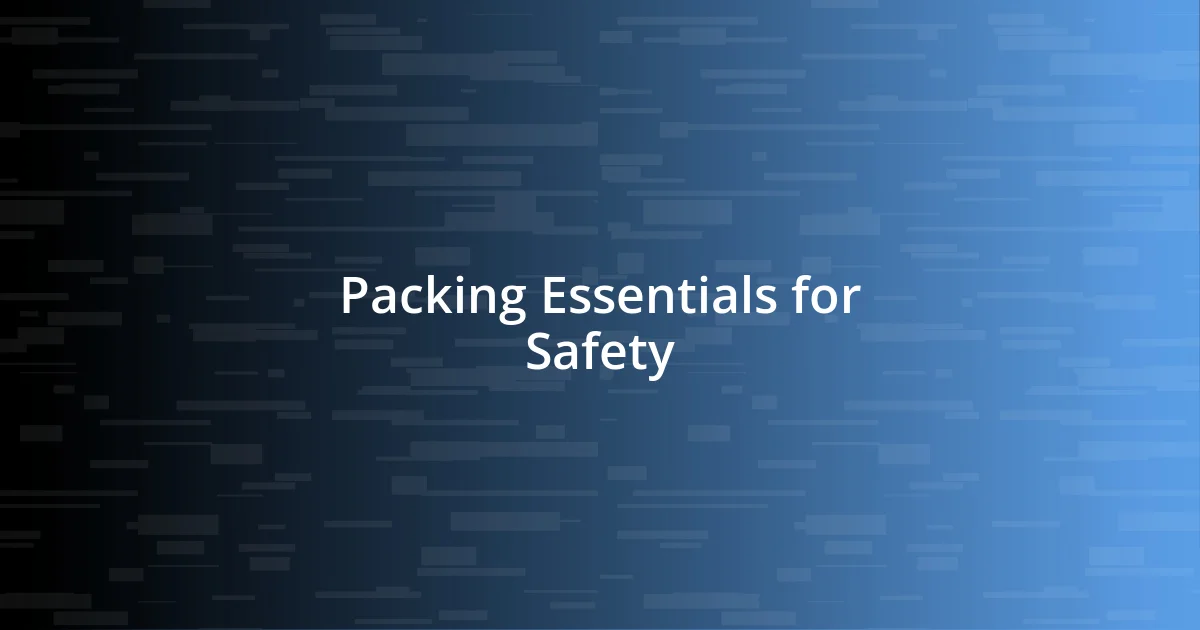
Packing Essentials for Safety
Packing essentials for safety is an area I’ve grown increasingly diligent about over the years. For instance, I never travel without a first aid kit. On a hiking trip a few years back, I stumbled upon a fellow traveler who accidentally twisted her ankle. Thankfully, I had some basic supplies to help her until professional medical assistance arrived. It made me realize how those few extra items can be lifesavers in unexpected situations.
Another important item I include is a personal safety alarm. I remember a late-night walk in a city that felt a bit too quiet. Having a loud alarm at my fingertips provided a sense of security that reassured me I could signal for help if needed. Plus, I find that just having it tucked in my bag elevates my confidence as I wander through new places. Isn’t it comforting to know there’s an extra layer of protection?
Don’t overlook the importance of keeping your valuables secure. I often use a money belt or a hidden pouch beneath my clothing. I recall when I was in a bustling market, and I saw how easily pickpockets could operate in crowded spaces. By keeping my cash and important documents secured against my body, I felt I could fully engage with my surroundings without the nagging worry of theft. After all, a little preparation can lead to a much more enjoyable travel experience.
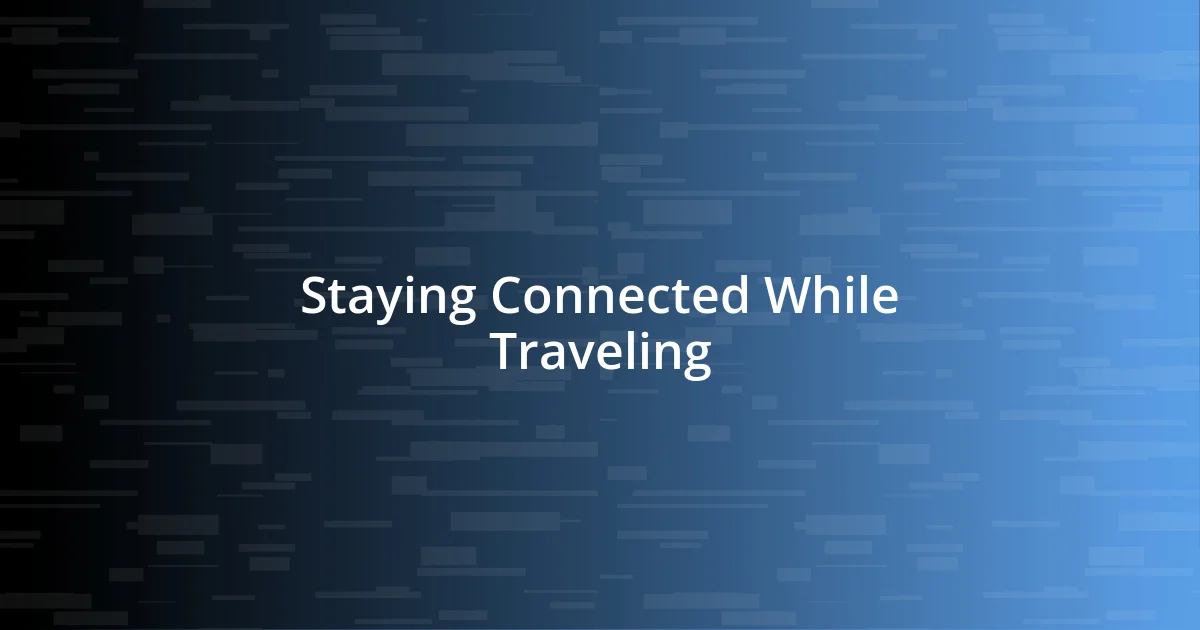
Staying Connected While Traveling
Staying connected while traveling can truly enhance your experience. I remember the sheer panic I felt when my GPS guide malfunctioned during a road trip in the countryside. Luckily, I had downloaded offline maps ahead of time. This little preparation saved not only my journey but also allowed me to explore hidden gems without straying too far off the path. Have you ever found yourself in a similar situation?
Another practical strategy I employ is utilizing local SIM cards or portable Wi-Fi hotspots. On a recent trip to Japan, this approach transformed my experience. I was able to communicate with locals and navigate public transport like a pro. The ease of connecting with friends and sharing those breathtaking moments on social media while sipping coffee in a Tokyo café made me realize how much staying connected adds to travel. It’s like having a safety net that allows you to dive into the new environment without losing touch with the world.
Let’s not forget about messaging apps. I often use them to keep in touch with family and friends back home. I recall how one late-night chat with my sister during my backpacking adventure in Southeast Asia brightened my mood when homesickness started creeping in. Those little conversations serve as a reminder of the people we cherish, no matter where we are in the world. After all, don’t you think sharing your journey makes it even more rewarding?

Understanding Local Laws and Customs
Understanding local laws and customs is a vital part of traveling safely. I remember landing in Egypt and being taken aback by the strict rules around public behavior, especially regarding dress codes in religious sites. It’s a respectful and eye-opening experience to navigate these cultural nuances, as they can greatly impact how locals perceive you. Have you ever felt uncertain about what’s acceptable in a new place?
During my travels in India, I encountered the importance of knowing local customs firsthand. For instance, in some regions, eating with your left hand is considered disrespectful. Initially, it caught me off guard, but once I learned the significance, I appreciated the rich tapestry of traditions. This awareness not only helped me avoid any faux pas but also deepened my connection with the local culture. Isn’t it fascinating how such small actions can lead to a greater understanding of people?
When I transitioned from one country to another, I found that familiarizing myself with local laws regarding photography was crucial. In places like Bhutan, taking photos of government buildings and military personnel is frowned upon. I recall hesitating in awe of a stunning landscape while worrying if my camera might breach local rules. These little insights made me realize that being informed not only keeps you out of trouble but also enriches your travel experience as you engage with the local community on a deeper level. How do you prepare for cultural differences when you travel?
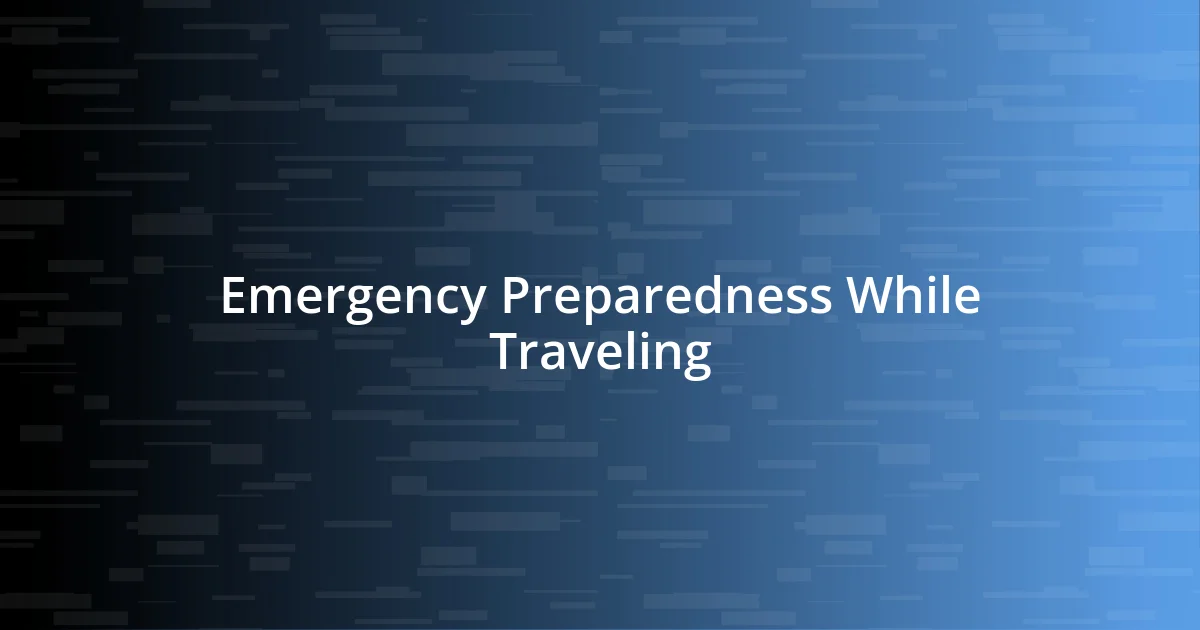
Emergency Preparedness While Traveling
So, let’s talk about emergency preparedness while traveling, which is something I always prioritize. On a trip to Costa Rica, I found myself in an unexpected situation when my friend tripped and sprained her ankle during a hike. Thankfully, we had a small first-aid kit with us. It was a game changer, allowing me to stabilize her ankle and make a plan for getting her back safely. Can you imagine being in a remote area without any way to address such a common mishap?
Having an emergency plan is just as crucial. I always make sure to jot down local emergency numbers and the address of the nearest hospital on my phone. During one of my travels in Thailand, my food allergies flared up. I was nervous and overwhelmed, but being able to quickly access emergency contacts helped me find medical assistance without wasting crucial time. Have you ever thought about how those frantic moments could turn into something manageable with a little preparation?
It’s also important to share your travel itinerary with someone back home. I learned this after my flight got delayed in Colombia, and I felt completely cut off. By sending my itinerary to a close friend, they knew where I was supposed to be, which provided me with peace of mind. This simple step felt like a safety net that could catch me if things went awry. Do you see the value in keeping loved ones informed while you explore new places?
